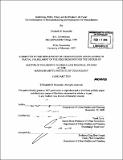| dc.contributor.advisor | Frank Levy. | en_US |
| dc.contributor.author | Reynolds, Elisabeth B | en_US |
| dc.contributor.other | Massachusetts Institute of Technology. Dept. of Urban Studies and Planning. | en_US |
| dc.coverage.spatial | n-us-ma | en_US |
| dc.date.accessioned | 2010-09-03T18:31:22Z | |
| dc.date.available | 2010-09-03T18:31:22Z | |
| dc.date.issued | 2010 | en_US |
| dc.identifier.uri | http://hdl.handle.net/1721.1/58380 | |
| dc.description | Thesis (Ph. D.)--Massachusetts Institute of Technology, Dept. of Urban Studies and Planning, 2010. | en_US |
| dc.description | "February 2010." Cataloged from PDF version of thesis. | en_US |
| dc.description | Includes bibliographical references (p. 203-209). | en_US |
| dc.description.abstract | Globalization has brought about a major shift in our understanding of how companies organize themselves and how they compete. The fragmentation of firms in their scope and structure, the vertical disintegration of firms through greater outsourcing, and the rise of global supply and value chains has led to new visions for companies ("metanational companies") and new models of production ("modular production networks") that "break free" from geography. In this global economy, many believe that manufacturing has little future in a high-skilled, high-wage region, given competition from lower cost countries. High-tech regions like Silicon Valley and Boston's Route 128 need to focus on design and innovation, and "let others produce what Americans think up." Proponents of this vision dismiss classic models like product life cycle theory (Vernon 1966), which explain the location of manufacturing through the timing of innovation and the maturity of products. To these critics, this model no longer holds because of the ubiquitous nature of innovation, the growth of advanced markets in emerging economies, and the ability to move manufacturing offshore before a product is even standardized. In this view, it is almost inevitable that manufacturing beyond prototypes cannot survive in high-wage countries like the U.S. This attitude, however, presents a false dichotomy between innovation and manufacturing. | en_US |
| dc.description.abstract | (cont.) This thesis argues that in advanced manufacturing industries such as biotech manufacturing, it is precisely innovation that brings this complex manufacturing activity to high-skilled, high-wage, technologically advanced regions of the world. This research examines the geographic evolution of biomanufacturing and finds that product life cycle theory provides an excellent model for understanding the dynamics of the industry, albeit with some twists which add to the richness of the literature. These twists are first, the role that institutions, specifically regulation, play in shaping the product life cycle by providing patents that slow the entry of competition. Second, public policy, specifically competitive international tax policy, has become a new differentiator between countries that are seeking to attract high value-added, high-wage manufacturing through the use of tax incentives. Tax-Advantaged Locations (TALs) have become the new low cost destination for advanced manufacturing despite their high wages and costs. Through interviews with 47 biomanufacturing executives and analysis of the geography of biomanufacturing investments made by 96 companies between 2002 and 2013, I find that technologically advanced regions such as Massachusetts retain the most innovative aspects of the industry, including early stage manufacturing as well as the first stage of commercial manufacturing. Massachusetts has a significant opportunity to retain and grow the industry, though the economic development impact is not in a large number of jobs, but in the building of a "regional system of innovation" based in human capital and companies that can usher in new technologies and emerging industries. | en_US |
| dc.description.statementofresponsibility | by Elisabeth B. Reynolds. | en_US |
| dc.format.extent | 211 p. | en_US |
| dc.language.iso | eng | en_US |
| dc.publisher | Massachusetts Institute of Technology | en_US |
| dc.rights | M.I.T. theses are protected by
copyright. They may be viewed from this source for any purpose, but
reproduction or distribution in any format is prohibited without written
permission. See provided URL for inquiries about permission. | en_US |
| dc.rights.uri | http://dspace.mit.edu/handle/1721.1/7582 | en_US |
| dc.subject | Urban Studies and Planning. | en_US |
| dc.title | Institutions, public policy and the product life cycle : the globalization of biomanufacturing and implications for Massachusetts | en_US |
| dc.title.alternative | Globalization of biomanufacturing and implications for Massachusetts | en_US |
| dc.type | Thesis | en_US |
| dc.description.degree | Ph.D. | en_US |
| dc.contributor.department | Massachusetts Institute of Technology. Department of Urban Studies and Planning | |
| dc.identifier.oclc | 630133385 | en_US |
